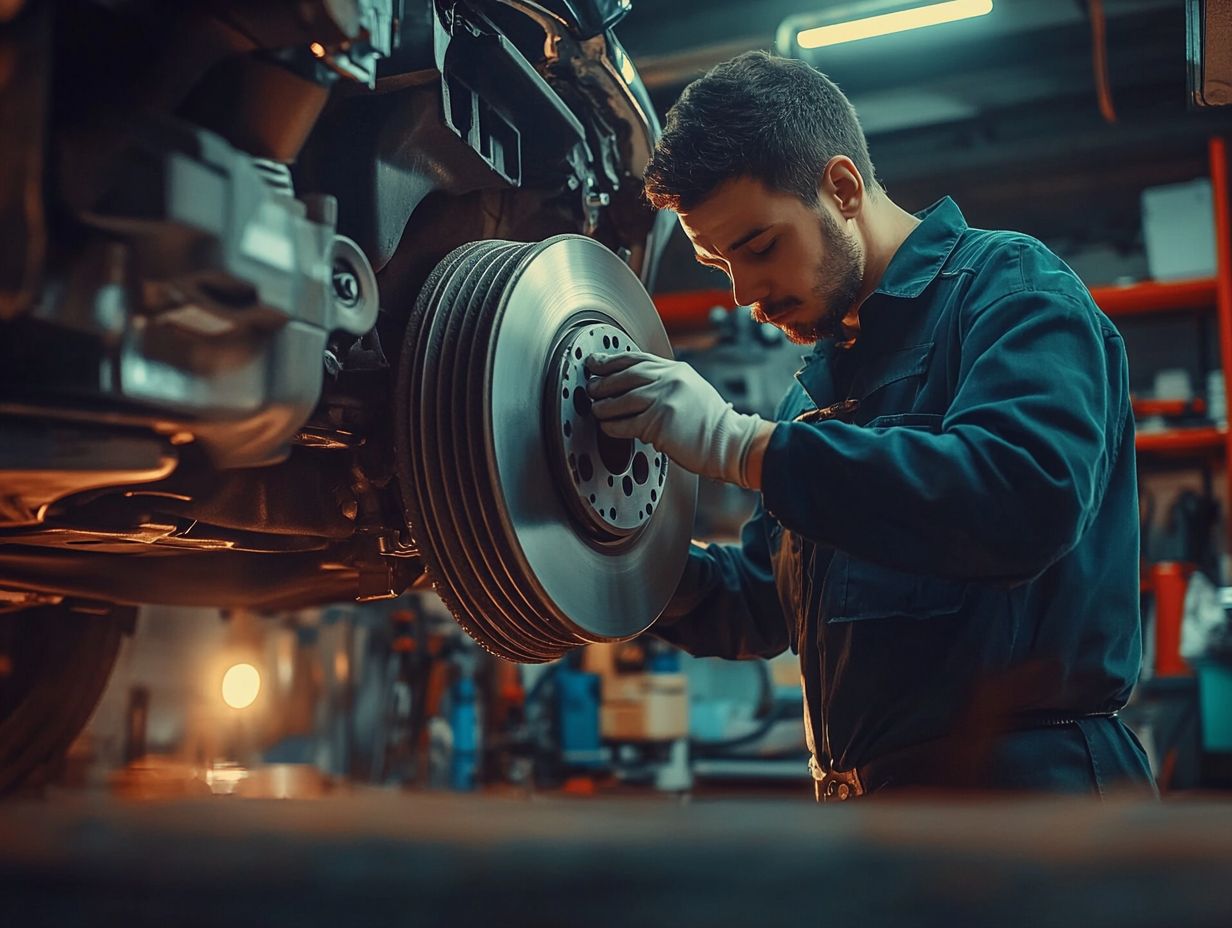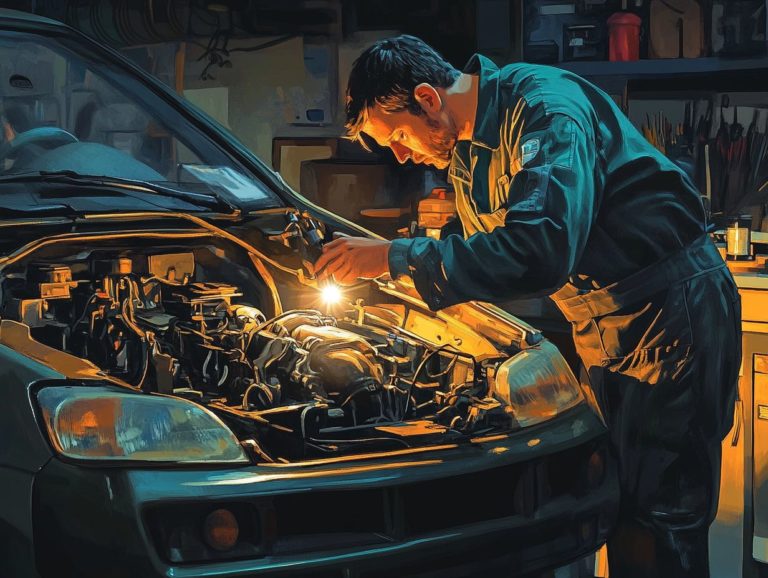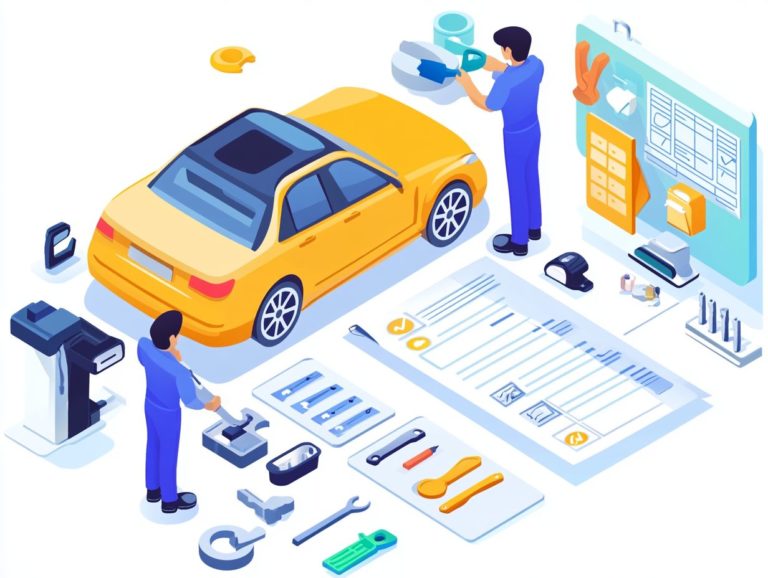The Importance of Regular Brake Maintenance
Brakes are among the most vital components of your vehicle, directly influencing both safety and performance.
Grasping how your brake system operates and recognizing the signs of wear can significantly enhance your driving experience. Knowing when to seek maintenance is essential for safety. This guide breaks down the essential elements of brake systems, highlights common warning signs of brake failure, and outlines the risks associated with neglecting maintenance.
This guide walks you through effective maintenance routines, weighs the pros and cons of DIY versus professional assistance, and offers tips for managing costs. Staying informed is key to ensuring your safety and that of others on the road.
Contents
- Key Takeaways:
- Understanding Brakes and Their Function
- Signs of Brake Wear and Tear
- The Dangers of Neglecting Brake Maintenance
- Regular Brake Maintenance Routine
- DIY vs. Professional Brake Maintenance
- What You’ll Pay for Brake Maintenance
- Frequently Asked Questions
- Why is regular brake maintenance important?
- How often should I get my brakes checked?
- What are the warning signs that my brakes need maintenance?
- What happens if I neglect regular brake maintenance?
- Is it necessary to have a professional perform brake maintenance?
- What can I do to maintain my brakes between check-ups?
Key Takeaways:
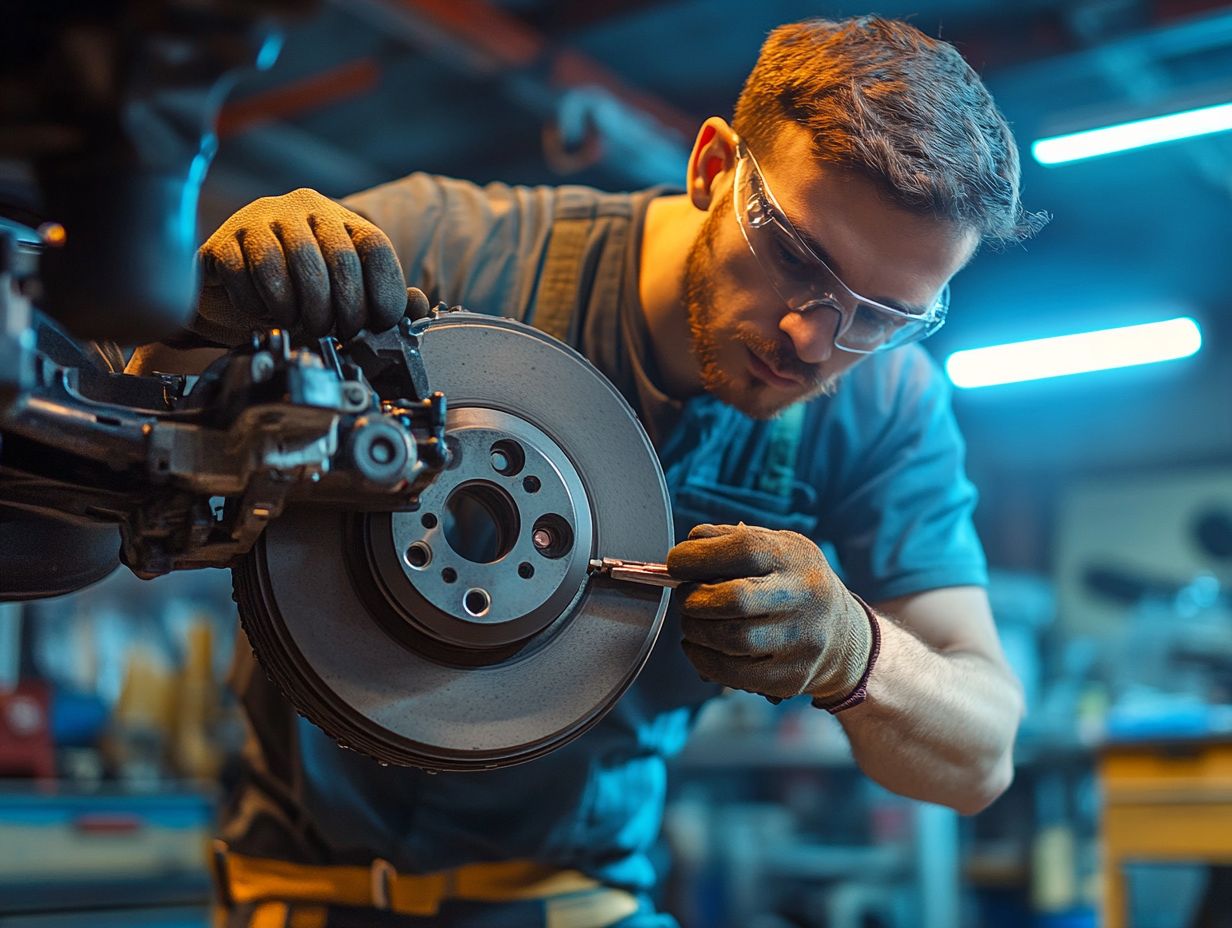
- Regular brake maintenance is crucial for ensuring safety and optimal vehicle performance.
- Neglecting brake maintenance can lead to costly repairs and compromise the safety of yourself and others on the road.
- Following a recommended maintenance schedule and choosing the appropriate option between DIY and professional maintenance can save you money in the long run.
Understanding Brakes and Their Function
Understanding brakes and their function is vital for maintaining your vehicle’s safety. Brakes are essential components engineered to deliver effective stopping power. This not only elevates your driving enjoyment but also significantly enhances overall road safety.
Your brake system consists of various intricate elements brake pads, rotors, and brake fluid all working in harmony to ensure reliable braking capability. By prioritizing regular brake service and inspections, you can prevent potential issues, allowing you to experience a safer drive with complete peace of mind.
Components of a Brake System
A brake system consists of critical components, including brake pads, brake fluid, and brake rotors, each playing an essential role in the braking process.
The brake pads are engineered to generate friction against the brake rotors, effectively slowing down or bringing your vehicle to a halt when you press the brake pedal. This friction transforms the vehicle’s movement energy into heat, ensuring a safe and smooth deceleration.
Brake fluid is crucial in hydraulic systems; it transmits the force from your brake pedal to the calipers the parts that press the brake pads against the rotors enabling fluid movement that engages the pads. Meanwhile, the brake rotors act as the contact surface for the pads, significantly influencing stopping efficiency.
Their design and material composition directly impact how quickly and effectively your vehicle can stop. This shows how crucial each part is for your brakes to work well.
Signs of Brake Wear and Tear
Recognizing the signs of brake wear and tear is essential for timely interventions and safeguarding your vehicle’s safety. Look out for common indicators such as unusual noises, a vibrating brake pedal, and the illumination of the brake service light.
These signals demand your immediate attention!
Common Warning Signs
Common warning signs of brake problems include annoying squeaks, grinding sounds, and a brake pedal that feels unusually soft. These issues are not just minor inconveniences; they often signal significant underlying problems that could jeopardize your vehicle’s braking efficiency.
Ignoring these indicators can lead to serious consequences, such as reduced stopping power or even total brake failure, putting you, your passengers, and others on the road at risk. Make regular brake checks a priority they’re crucial for your safety!
Keeping meticulous maintenance records is essential for tracking any repairs or inspections you’ve completed. By ensuring timely repairs, you help preserve optimal braking performance, enhancing overall road safety and extending the life of your vehicle.
The Dangers of Neglecting Brake Maintenance
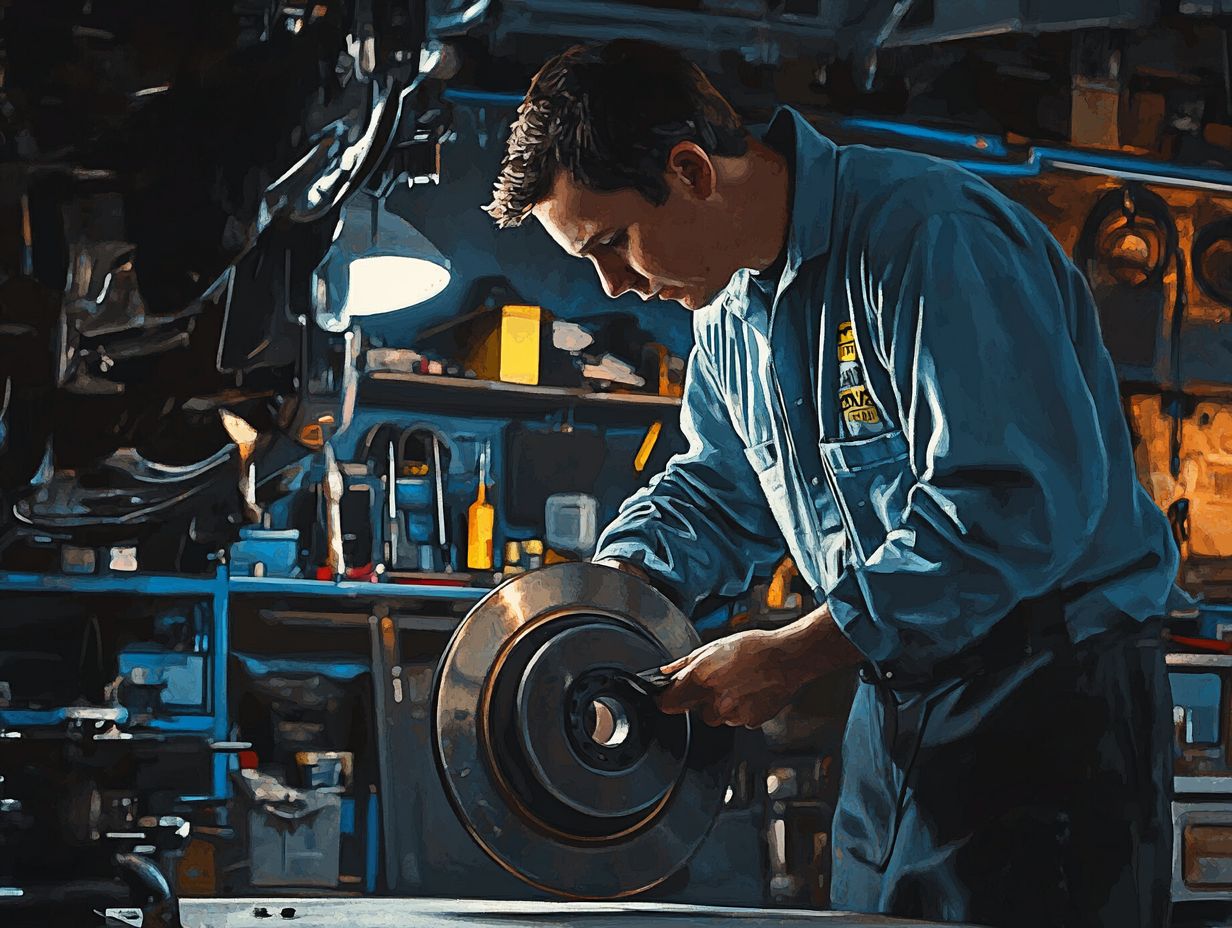
Neglecting brake maintenance creates serious safety hazards. It profoundly affects your vehicle’s performance and escalates repair costs due to preventable brake issues.
Ensuring your brakes are regularly serviced is not just a matter of convenience; it’s essential for your safety and highlights the importance of regular maintenance to prevent repairs and maintain the integrity of your vehicle.
Impact on Safety and Vehicle Performance
Neglecting brake maintenance can profoundly affect both safety and vehicle performance. Ineffective brakes threaten your safety and the overall driving experience.
When your brakes fail to work correctly, the risks escalate dramatically, endangering not just you but everyone on the road. A delayed response during a sudden stop can turn an ordinary drive into a potential catastrophe. This underscores the urgent necessity for regular inspections and timely repairs.
Well-functioning brakes are crucial; they ensure your vehicle can respond swiftly in emergencies and contribute to smoother deceleration, enhancing your comfort and control behind the wheel. Prioritizing brake maintenance is vital for safeguarding lives while elevating your enjoyment of driving.
Regular Brake Maintenance Routine
Establishing a regular brake maintenance routine is essential for ensuring the longevity and optimal functionality of your vehicle’s brake system. This typically involves routine inspections and services at authorized dealers, allowing you to drive with confidence and peace of mind.
Recommended Schedule and Procedures
A well-structured brake maintenance schedule should include periodic inspections every six months or after 6,000 miles, along with routine checks for brake pads and fluid levels.
Regularly checking these parts is crucial for your safety! Neglecting them can lead to a decrease in stopping power, creating hazardous situations.
Start by examining the brake fluid level; this is the liquid that helps your brakes work properly. Insufficient fluid can cause brake pressure issues, which can make it harder to stop your vehicle.
Next, visually inspect the brake pads for signs of wear, such as thinning material or uneven surfaces. These are clear indicators that a replacement may be necessary.
Familiarizing yourself with your vehicle s owner manual is crucial. It provides specific recommendations for your brake system and highlights signs that may suggest immediate replacement of critical components, ensuring your safety on the road.
DIY vs. Professional Brake Maintenance
When considering brake maintenance, you often find yourself at a crossroads: should you tackle the repairs yourself or entrust the task to certified brake mechanics at authorized dealers? Each option presents its own set of advantages, and the decision ultimately depends on your comfort level, expertise, and the importance you place on safety.
Pros and Cons of Each Option
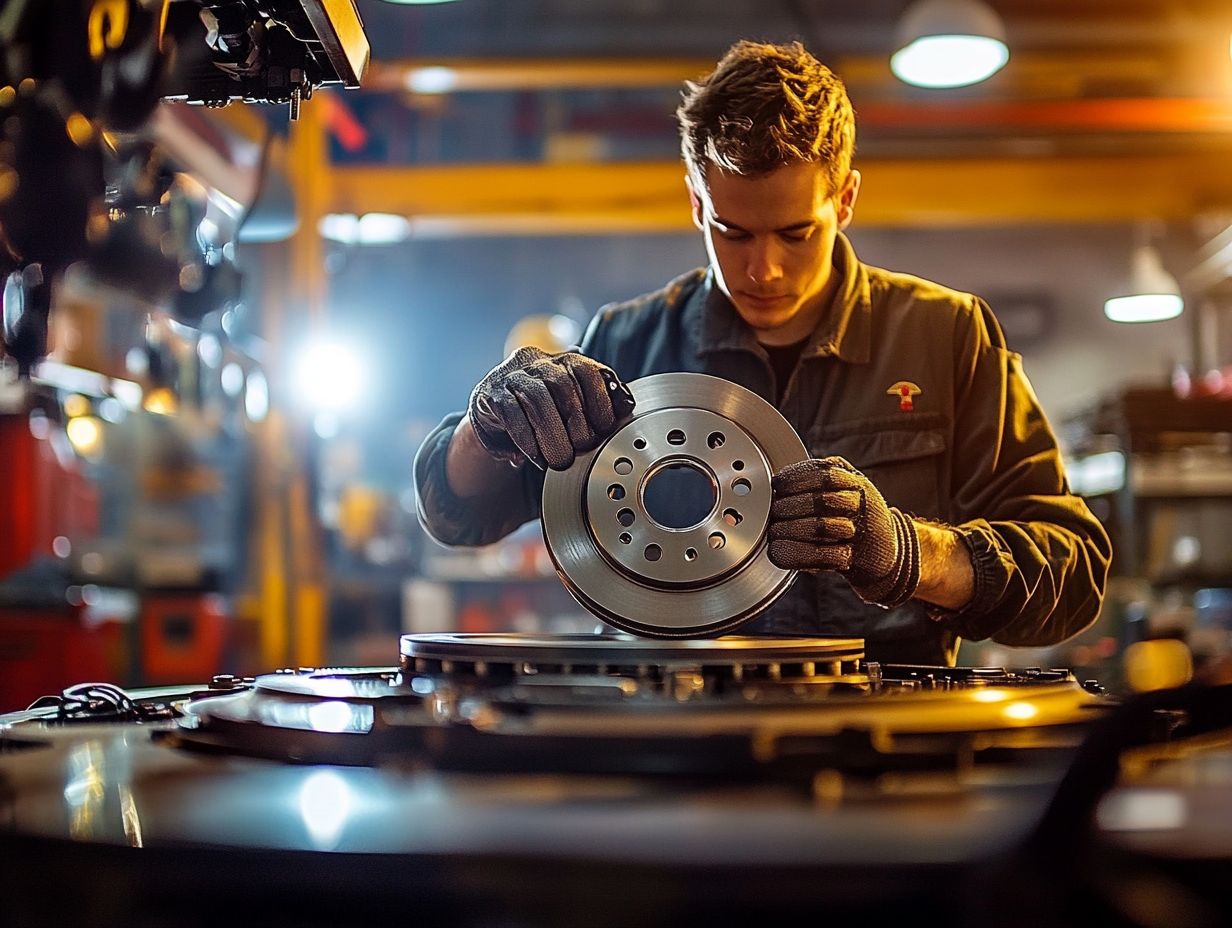
Choosing between DIY brake service and professional brake service means weighing the allure of cost savings against the invaluable peace of mind that comes with expert knowledge and quality assurance.
While it may be tempting to dive into a DIY project to save money, the potential costs associated with mistakes or subpar repairs can skyrocket quickly. The efficiency of your brakes is non-negotiable; any oversight in this critical safety system could lead to diminished performance or even perilous situations on the road.
In the end, ensuring your personal safety and extending the lifespan of your braking system often outweighs the initial financial considerations of seeking professional assistance. By thoughtfully assessing these factors, you can make the safest and most effective decision for your vehicle.
What You’ll Pay for Brake Maintenance
Understanding the costs tied to brake maintenance is crucial for you as a vehicle owner. Repair expenses can fluctuate significantly depending on various factors, such as the type of brakes, labor involved, and whether a complete brake replacement is necessary.
Factors Affecting Cost and How to Save Money
Several factors influence your brake maintenance costs, including the type of brake pads you choose, the labor involved, and the frequency of brake service light alerts that might signal underlying issues.
You can save money by taking proactive steps. Scheduling regular inspections is crucial; it helps you catch emerging problems early, preventing them from becoming severe and costly repairs. Early intervention helps preserve the integrity of your braking system and extend the lifespan of its components.
When selecting replacement parts, opting for quality brake pads and components over cheaper alternatives might seem like a higher initial investment. However, it ultimately protects you from frequent replacements, ensuring both your safety and your savings.
Frequently Asked Questions
Why is regular brake maintenance important?
Regular brake maintenance is vital for ensuring your brakes function properly and can effectively stop your vehicle when needed. Additionally, understanding the benefits of regular brake inspections helps prevent brake failures and accidents.
How often should I get my brakes checked?
Don t wait get your brakes checked at least once a year or every 12,000 miles! If you notice any warning signs like squeaking or grinding noises, get them checked immediately.
What are the warning signs that my brakes need maintenance?
Common warning signs include squeaking or grinding noises, a brake pedal that feels soft or less responsive, vibrations when braking, and longer stopping distances.
What happens if I neglect regular brake maintenance?
Neglecting brake maintenance can reduce your braking performance, potentially causing accidents. It can also lead to more expensive repairs, as damaged brakes may harm other vehicle parts.
Is it necessary to have a professional perform brake maintenance?
While some basic tasks, like replacing brake pads, can be done at home, it s best to have a professional perform a thorough brake inspection. They possess the necessary knowledge and tools to properly assess and address potential issues.
What can I do to maintain my brakes between check-ups?
To maintain your brakes, regularly check the brake fluid level and top it off if needed. Avoid harsh braking and driving habits, and keep an eye out for warning signs. If you notice changes in performance, have your brakes checked.
